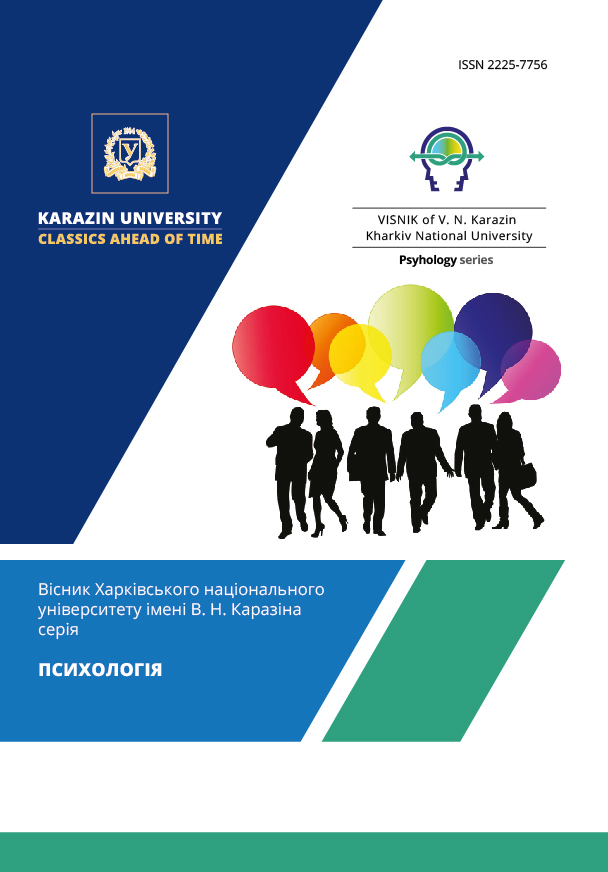CONCEPTUAL POTENTIAL OF POSITIVE PSYCHOTHERAPY IN STUDY- ING EMOTIONAL INTELLIGENCE OF AN INDIVIDUAL
Abstract
The article analyzes the conceptual potential of positive psychotherapy in studying the role of emotional intelligence (EQ) in the process of personal life fulfilment. Components of EQ, the organismic sense (the mechanism of understanding) and emotional competence (the mechanism of interpretation), have been found to be formed on the basis of innate abilities to love and learn. The imbalance in their development leads to the formation of a naive-primary or secondary-reactive type of personality, which is characterized by an internal or external mode of life, respectively. The former condition is marked by prevailing primary abilities and a neurotic need for contact (with oneself or with others), while the latter – by the dominance of secondary abilities and a compensatory reaction of escape into activity. The most optimal in terms of a congruent, meaningful and authentic life is an integrative mode, characterized by a relative harmony of actual abilities, and a high and balanced level of development of both EQ components. It has been established that basic emotional settings in the spheres of the I and Proto-We are responsible for the development of the organismic sense, whereas those of the We and You contribute to the formation of emotional competence. Thus, the organismic sense evolves mainly in the domains of Body and Senses, whereas emotional competence - through Activity and Contacts. This is due to the psychosomatic and axiological potential of the organismic sense, on the one hand, and the activity-based and social character of emotional competence, on the other. An innate ability to develop them has been proved by modern neurological studies. In accordance with them, interpretation is an innate ability of the human brain to construct an intra- and extrapsychic reality, which is later comprehended through understanding.
Downloads
References
Barrett L.F. Yak narodzhuiutsia emotsii: Taiemne zhyttia mozku ; [per. z anhl. Ya. Lebedenka] / L.F. Barrett. − Kharkiv : Klub simeinoho dozvillia, 2018. − 480 s.
Vsemirnaja jenciklopedija : Filosofia / Glavn. nauch. red. i sost. A.A. Gricanov. − M. : AST, Mn. : Harvest, − Sovremennyj literator, 2001. − 1312 s.
Goulman D. Jemocional’nyj intellekt na rabote / Djeniel Goulman ; [per. s angl. A. P. Isaevoj]. – M. : AST: AST MOSKVA; Vladimir : VKT, 2010. – 476 s.
Goulman D. Emotsiinyi intelekt / D. Goulman ; [per. z anhl. S.-L. Humetskoi]. − Kharkiv : Vivat, 2018. − 512 s.
Karikash V.I. Pjat’ vershin na zhiznennom puti: psihoterapija posredstvom transformacii jekzistencial’noj identichnosti / V.I. Karikash // Pozitum Ukraina : nauch.-prakt. zh-l. – 2008. – №2. – S. 18 – 20.
Karpenko Ye. Samoaktualizatsiia i adaptatsiia: vid konfrontatsii do kooperatsii monohrafia / Yevhen Karpenko. – Ivano-Frankivsk : Nova Zoria, 2013. – 272 s.
Ljusin D.V. Novaja metodika dlja izmerenija jemocional’nogo intellekta : oprosnik JemIn / D.V. Ljusin // Psihologicheskaja diagnostika. – 2006. – № 4. – S. 3 – 22.
Nosenko E.L. Emotsiinyi intelekt: kontseptualizatsiia fenomenu, osnovni funktsii : monohrafia / E.L. Nosenko, N.V. Kovryha. − K. : 2003. − 159 s.
Pezeshkian N. Psihosomatika i pozitivnaja psihoterapija / Nossrat Pezeshkian ; [per. s nem.]. – M. : Medicina, 1996. – 464 s.
Pezeshkian N. Trening razreshenija konflktov. Psihoterapija povsednevnoj zhizni. / N. Pezeshkian ; [per. s nem.]; 2-e izdanie. − M. : Institut pozitivnoj psihoterapii, 2007. − 296 s.
Psihologija lichnosti: Slovar’-spravochnik / Pod red. P. P. Gornostaja, T. M. Titarenko. Kiev : RUTA, 2001. − 320 s.
Talanov V.L. Spravochnik prakticheskogo psihologa / V.L. Talanov, I.G. Malkina-Pyh. − SPb. : Sova; M. : JeKSMO, 2003. − 928 s.
Cherenshchykova D.V. Pozytyvna psykhoterapiia yak zasib optymizatsii pedahohichnoho spilkuvannia u vyshchykh navchalnykh zakladakh : avtoref. dys. ... kand. psykhol. nauk : 19.00.07 – pedahohichna ta vikova psykholohiia / Cherenshchykova Daria Viktorivna. – Ivano-Frankivsk, 2011. – 20 s.
Chetveryk-Burchak A.H. Mekhanizmy vplyvu emotsiinoho intelektu na uspishnist zhyttiediialnosti osobystosti : dys. ... kand. psykhol. nauk: 19.00.01 – zahalna psykholohiia, istoriia psykholohii / Chetveryk-Burchak Alina Hryhorivna. – Dnipropetrovsk, 2015. – 187 s.
Shpak M. Psykholohichni osnovy rozvytku emotsiinoho intelektu molodshykh shkoliariv : dys. ... d-ra psykhol. nauk: 19.00.07 – pedahohichna ta vikova psykholohiia / Shpak Mariia Myroslavivna. – K., 2018. – 560 s.
Shtajner K. Jemocional’naja gramotnost’: intellekt s serdcem. Rukovodstvo po uluchsheniju lichnyh i professional’nyh otnoshenij / Klod Shtajner.− K. : TOV «NVP «Interservis», 2016. − 303 s.




